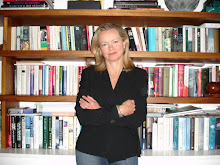
(If you need a caption for this image, you probably shouldn't be reading this blog)
Hands up if you remember the 1980s? You know, when eyeliner was everywhere, greed was good and mobile phones bigger than bricks were the de rigeur symbols of status.
Back then, I was still a starry eyed young journalist, on my first foreign postings, trying valiantly to shine a little light onto some of the world’s worthier stories. Unsurprisingly, I was utterly unmoved by the entreaties of one particular suitor, who thought the way to my heart would be to whisk me off to lunch at the Ivy – in his Porsche natch - where his lavish corporate expense account allowed him to entertain clients and contacts several times a week.
Actually, it wasn’t the Porsche, the brick-sized mobile or even the bow tie that put me off. Reader: he was a media buyer – the very thought of consorting with a non-creative ad exec sent shivers down my spine. Back then, media buying was not considered an entirely respectable occupation for a gentleman.
But that was then and things have certainly changed in our brave new media world. Humble journalists are obliged to twist their copy to suit complex new click metrics while the media buying behemoths continue to consolidate the power now afforded them by the transparency and accountability of the world wide intraweb.
You may have heard, if only vaguely, of companies called Aegis, Omnicom, Havas, Zenith and WPP, but you probably have little idea of how powerful they have become, given that jointly they control more than 50 per cent of the global advertising market.
This was the frankly chilling scenario eloquently explained by Professor Joseph Turow this week at the Oxford Internet Institute at an event jointly organised by the inestimable Reuters Institute for the Study of Journalism. Professor Turow suggested that the rise of the buyers, leaving the usually lauded creative element of the advertising industry behind, has been under-reported and is – as a consequence – misunderstood.
That newspapers, news journalism and news values per se are undergoing a fundamental change is not news but Turow painted a vivid picture of a media future in which the key players were no longer the once mighty publishing platforms. Those (to some extent, already) in charge will be the media buying agencies, the advertisers, the media rating companies, some third party ad networks and of course, the technology developers.
But what about the journalists, you ask? Well, those who haven’t already crossed the PR Rubicon or been replaced by a far, far cheaper, Anglophone typist on the ground in Bangalore, may be lucky enough to find work with an altruistic foundation, generously funding issue-based journalism along the lines of ProPublica.
There may also still be some work available for hacks prepared to specialise – as advertisers will continue to be willing to fund niche supplements serving distinct interests. Oh and guess what? There is also going to be an awful lot more “refining” of what purports to be straight news to allow for (yet more) product placement.
Prof. Turow, a genial (coincidentally, also bow-tied) Brooklynite, is the author of the cerebral but highly accessible "Niche Envy" and is considered to be the expert on media fragmentation. He also foresaw a future of merged regional news cooperatives and a diverse raft of new organisational forms and alliances between traditional prestige content providers. In principle, this sounds like a reasonable solution, although I have had personal experience of dozens of newspapers attempting to work “together” from my stint as editor of Guardian Europe in the early 1990s and at times, I have to admit, it was not a particularly pretty sight.
So far then, so bleak for all my keen journalism students. I keep telling them to go into something rather less precarious, like investment banking perhaps? No, better still, make that financial PR. And what of the smooth Porsche-driving, bow tied beau, I hear you ask? Reader, I married him.




